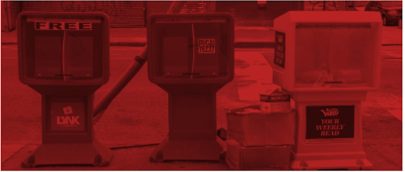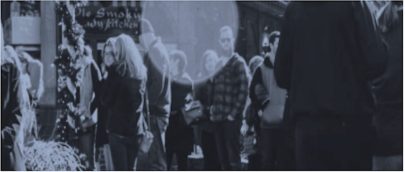Illinois' Landmark Legislation to Support Local News
The official legislative language for Illinois’ policies on employment tax credits for local newsrooms, disclosures for newspaper sales to out-of-state buyers, and scholarships for in-state journalists.
Employment Credit
ARTICLE 40.
section 40-1. Short title. This Act may be cited as the Local Journalism Sustainability Act. References in this Article to “this Act” mean this Article.
Section 40-5. Definitions.
“Award cycle” means the 4 reporting periods for which the employer is awarded a credit under Section 40-10.
“Comparable rate” has the meaning given to that term by the Federal Communications Commission in its campaign advertising rate rules.
“Department” means the Department of Commerce and Economic Opportunity.
“Independently owned” means, as applied to a local news organization, that:
(1) the local news organization is not a publicly traded entity and no more than 5% of the beneficial ownership of the local news organization is owned, directly or indirectly, by a publicly traded entity; and
(2) the local news organization is not a subsidiary. “Local news organization” means an entity that:
(1) engages professionals to create, edit, produce, and distribute original content concerning matters of public interest through reporting activities, including conducting interviews, observing current events, or analyzing documents or other information;
(2) has at least one employee who meets all of the following criteria:
(A) the employee is employed by the entity on a full-time basis for at least 30 hours a week;
(B) the employee’s job duties for the entity consist primarily of providing coverage of Illinois or local Illinois community news as described in paragraph (C);
(C) the employee gathers, prepares, collects, photographs, writes, edits, reports, or publishes original local or State community news for dissemination to the local or State community; and
(D) the employee lives within 50 miles of the coverage area;
(3) in the case of a print publication, has published at least one print publication per month over the previous 12 months and either (i) holds a valid United States Postal Service periodical permit or (ii) has at least 25% of its content dedicated to local news;
(4) in the case of a digital-only entity, has published one piece about the community per week over the previous 12 months and has at least 33% of its digital audience in Illinois, averaged over a 12-month period;
(5) in the case of a hybrid entity that has both print and digital outlets, meets the requirements in either paragraph (3) or (4) of this definition;
(6) has disclosed in its print publication or on its website its beneficial ownership or, in the case of a not-for-profit entity, its board of directors;
(7) in the case of an entity that maintains tax status under Section 501(c)(3) of the federal Internal Revenue Code, has declared the coverage of local or State news as the stated mission in its filings with the Internal Revenue Service;
(8) has not received any payments of more than 50% of its gross receipts for the previous year from political action committees or other entities described in Section 527 of the federal Internal Revenue Code or from an organization that maintains Section 501(c)(4) or 501(c)(6) status under the federal Internal Revenue Code, unless those payments are for political advertising during the lowest unit windows and using comparable rates; and
(9) has not received more than 30% of its revenue from the previous taxable year from political advertisements during lowest unit windows.
“Local news organization” does not include an organization that received more than $100,000 from organizations described in paragraph (8) during the taxable year or any preceding taxable year
“Lowest unit window” has the meaning given to that term by the Federal Communications Commission in its campaign advertising rate rules.
“New journalism position” means an employment position that results in a net increase in qualified journalists employed by the local news organization from January 1 of the preceding calendar year compared to January 1 of the calendar year in which a credit under this Act is sought.
“Private fund” means a corporation that:
(1) would be considered an investment company under Section 3 of the Investment Company Act of 1940, 15 U.S.C. 80a-3, but for the application of paragraph (1) or (7) of subsection (c) of that Section;
(2) is not a venture capital fund, as defined in Section 275.203(l)-1 of Title 17 of the Code of Federal Regulations, as in effect on the effective date of this Act; and
(3) is not an institution selected under Section 107 of the federal Community Development Banking and Financial Institutions Act of 1994.
“Qualified journalist” means a person who:
(1) is employed for an average of at least 30 hours per week; and
(2) is responsible for gathering, developing, preparing, directing the recording of, producing, collecting, photographing, recording, writing, editing, reporting, designing, presenting, distributing, or publishing original news or information that concerns local matters of public interest.
“Reporting period” means the quarter for which a return is required to be filed under Article 7 of the Illinois Income Tax Act. Section 40-10. Credit award. For reporting periods that begin on or after January 1, 2025 and before January 1, 2030, employers, including employers that maintain tax status under Section 501(c)(3) of the federal Internal Revenue Code, that are local news organizations and that are required to deduct and withhold taxes as provided in Article 7 of the Illinois Income Tax Act are eligible to receive a credit against payments due under Section 704A of the Illinois Income Tax Act. The credit shall be $15,000 per qualified journalist employed and paid by the employer during the 12-month period immediately preceding the date on which the employer applies for a credit under this Section. An additional credit of $10,000 shall be awarded against payments due under Section 704A of the Illinois Income Tax Act for each qualified journalist who fills a new journalism position for the employer during the 12-month period immediately preceding the date on which the employer applies for a credit under this Section. No more than $150,000 in credits under this Act may be awarded to any one local news organization in a single calendar year. If the local news organization is not independently owned or lists a private fund among its beneficial ownership, no more than $250,000 in credits may be awarded in a single calendar year to all local news organizations that share the same ownership interest. The total amount of credits that may be awarded under this Act in any given calendar year may not exceed $5,000,000, of which no more than $4,000,000 may be awarded for the $15,000 credit that applies to qualified journalists, and no more than $1,000,000 may be awarded for the additional $10,000 credit that is awarded for new journalism positions. Credits under this Section shall be awarded by the Department on a first-come, first-served basis. The Department shall issue a credit certificate to each eligible local news organization. Upon issuance of the credit certificate, the Department shall inform the Department of Revenue, in the form and manner as agreed between the agencies, of the date the credit certificate was issued, the name and tax identification number of the recipient, the amount of the credit, and such other information as the Department of Revenue may require. The credit certificate shall be attached to the taxpayer’s return.
The credit shall be applied to the first reporting period after the credit certificate is issued and that begins on or after January 1, 2025. If the amount of credit exceeds the liability for the reporting period, the excess credit shall be refunded to the taxpayer. Section 40-15. Application for local journalism certificate.
(a) In order to qualify for a tax credit award under this Act, an applicant must apply with the Department, in the form and manner required by the Department, for each award cycle for which a credit under this Act is sought, providing information necessary to calculate the tax credit award and any additional information as reasonably required by the Department. A separate application shall be filed for each local news organization. The tax credit award shall be calculated based upon the filing by the applicant on forms prescribed by the Department. The Department shall cooperate with the Department of Revenue as needed in order to determine credit amount and eligibility.
(b) Upon satisfactory review of the application, the Department shall issue a local journalism certificate stating the amount of the tax credit award to which the applicant is entitled for the credit period and shall contemporaneously notify the applicant and Department of Revenue upon issuance of the certificate. Section 40-20. Powers of the Department. The Department and the Department of Revenue may, in consultation, adopt any rules necessary to administer the provisions of this Act.
Section 40-25. Program terms and conditions. Any documentary materials or data made available or received from an applicant by any agent or employee of the Department are confidential and are not public records to the extent that the materials or data consist of commercial or financial information regarding the operation of, or the production of, the applicant or recipient of any tax credit award under this Act.
Notice of sale of a local news organization.
A local news organization shall not be sold to a company without giving written notice 120 days before the sales occurs to the following: (1) affected employees and representatives of affected employees; (2) the Department and the county government in which the local news organization is located; and (3) any in-State nonprofit organization in the business of buying local news organizations.
Scholarship for Illinois Journalists
The Higher Education Student Assistance Act is amended by adding Section 65.125 as follows:
(110 ILCS 947/65.125 new)
Sec. 65.125. Journalism Student Scholarship Program.
a) As used in this Section, “local news organization” has the meaning given to that term in the Strengthening Community Media Act.
(b) In order to encourage academically talented Illinois students to pursue careers in journalism, especially in underserved areas of the State, and to provide those students with financial assistance to increase the likelihood that they will complete their full academic commitment and elect to remain in Illinois to pursue a career in journalism, subject to appropriation, not sooner than the 2025-2026 academic year, the Commission shall implement and administer the Journalism Student Scholarship Program. The Commission shall annually award scholarships to persons preparing to work in Illinois, with preference given to those preparing to work in underserved areas. These scholarships shall be awarded to individuals who make application to the Commission and agree to sign an agreement under which the recipient pledges that, within the 2-year period following the termination of the academic program for which the recipient was awarded a scholarship, the recipient shall:
(1) begin working in journalism in this State for a period of not less than 2 years;
(2) fulfill this obligation at local news organization; and
(3) upon request of the Commission, provide the Commission with evidence that the recipient is fulfilling or has fulfilled the terms of the teaching agreement provided for in this subsection.
(c) An eligible student is a student who meets the following qualifications:
(1) is a resident of this State and a citizen or eligible noncitizen of the United States;
(2) is a high school graduate or a person who has received an Illinois high school diploma;
(3) is enrolled or accepted, on at least a half-time basis, at an institution of higher learning; and
(4) is pursuing a postsecondary course of study leading to a career in journalism or a similar field.
(d) Each scholarship shall be used by the recipient for the payment of tuition and fees at an institution of higher learning.
(e) The Commission shall administer the Program and shall adopt all necessary and proper rules not inconsistent with this Section for its effective implementation.




